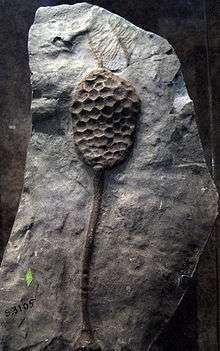Paracrinoidea
Paracrinoidea is an extinct class of blastozoan echinoderms. They lived in shallow seas during the Early Ordovician through the Early Silurian. While blastozoans are usually characterized by types of respiratory structures present, it is not clear what types of respiratory structures paracrinoids likely had. Despite the taxon's name, the paracrinoids are not closely related to crinoids.
| Paracrinoidea | |
|---|---|
 | |
| Comarocystites punctatus | |
| Scientific classification | |
| Kingdom: | Animalia |
| Phylum: | Echinodermata |
| Subphylum: | †Blastozoa |
| Class: | †Paracrinoidea Regnell, 1945 |
| Orders | |
| |
Paracrinoids are characterized by a mouth with two to five feeding arms arranged asymmetrically, or somewhat bisymmetrically. They have a U-shaped gut, and their anus is located next to the mouth. They have irregularly shaped bodies (theca), and a stem, superficially similar to crinoids, and may have used the stem to attach themselves to a substrate, although some reconstructions show them partially buried in sediment.[1]
Only 13 to 15 genera are known. See List of echinodermata orders
Class Paracrinoidea
- Order †Comarocystitida
- ?Family †Heckeritidae
- †Heckerites
- Family †Amygdalocystitidae
- †Achradocystites Volborth, 1870
- †Amygdalocystites Billings, 1854 (= Ottawacystis) (?= Billingsocystis)
- †Oklahomacystis Parsley & Mintz, 1975 (Bassler, 1943)
- †Ovulocystites Frest et al., 1980
- Family †Comarocystitidae Balther, 1899
- †Comarocystites Billings, 1854
- †Implicaticystis
- †Sinclairocystis
- ?Family †Heckeritidae
- Order †Platycystitida
- Family †Platycystitidae
- Subfamily †Canadocystinae Frest, Strimple, & Coney, 1979
- †Canadocystis (=Sigmacystis)
- Subfamily †Platycystitinae Frest, Strimple, & Coney, 1979
- †Globulocystites Frest, Strimple, & Coney, 1979
- †Globulocystites rotundatus Frest, Strimple, & Coney, 1979 (type)
- †Globulocystites cristatus (Bassler) (Referred to Globulocystites by Frest, Strimple, & Coney, 1979)
- †Globulocystites infundus Frest, Strimple, & McGinnis, 1977, p. 215 (Referred to Globulocystites from Platycystites by Frest, Strimple, & Coney, 1979)
- †Platycystites Miller, 1889
- †Platycystites faberi Miller, 1889 (type)
- †Platycystites ovalis Frest, Strimple, & Coney, 1979
- †Platycystites sp. Frest, Strimple, & Coney, 1979 (NMNH 112086, Blackriverian, Bromide Formation, Carter County, Oklahoma)
- †Globulocystites Frest, Strimple, & Coney, 1979
- Subfamily †Canadocystinae Frest, Strimple, & Coney, 1979
- †Family Malocystitidae
- †Malocystites
- †Wellerocystis
- †Family Bistomiacystitidae
- †Bistomiacystis
- Family †Platycystitidae
- Order incertae sedis
- †Family Springerocystidae Bassler, 1950 (suggested as paracrinoids related to Canadacystis by Sprinkle, 1973, but Parsley & Mintz, 1975 regarded them as eocrinoids, as originally described)[2]
- †Columbocystis
- †Foerstecystis
- †Springerocystis
- †Family Springerocystidae Bassler, 1950 (suggested as paracrinoids related to Canadacystis by Sprinkle, 1973, but Parsley & Mintz, 1975 regarded them as eocrinoids, as originally described)[2]
Doubtful paracrinoids:
- †Allocystites (suggested as a paracrinoid related to Canadacystis by Sprinkle, 1973 but not Parsley & Mintz, 1975)
- †Paleocystites
- †Ulrichocystis
Phylogeny after Limbeck (2018)
-+-- C. laevis (Cryptocrinites laevis?)
`--+-- Columbocystis ovata (Columbocystis ovata? Eocrinoid)
|-- Columbocystis typica
`--+--+-- Bistomiacystis globosa
| |-- Bistomiacystis schrantzi
| `-- Achradocystites schmidti
`--+--+-- Comarocystites punctatus
| |-- Comarocystites tribrachius
| |-- Implicaticystis shumardi
| `-- Implicaticystis symmetricus
`--+-- Canadocystis tennesseensis
`--+-- Canadocystis barrandei
|-- Canadocystis emmonsi
`--+-- Malocystites murchisoni
`--+-- Sinclairocystis praedicta
|--+-- Amygdalocystites florealis
| |-- Amygdalocystites radiatus
| |-- Oklahomacystis bibrachiatus
| |-- Oklahomacystis spissus
| |-- Oklahomacystis tribrachiatus
| |-- Oklahomacystis trigonis
| `-- Wellerocystis kimmswickensis
`--+-- Globulocystites cristatus
|-- Globulocystites rotundatus
|-- Globulocystites (originally Platycystites) infundus
|-- Platycystites cristatus
`-- Platycystites faberi
References
- Fossil Invertebrates, 1987, Boardman, Richard S., Cheetham, Alan H., and Rowell, Albert J., editors, pp. 580-1. Blackwell Scientific Publications.
- "†family Springerocystidae Bassler 1950". Fossilworks. Retrieved 2020-06-20.
- Frest, T. J.; Strimple, H. L.; Coney, C. C. (1979). "Paracrinoids (Platycystitidae) from the Benbolt Formation (Blackriverian) of Virginia". Journal of Paleontology. 53 (2): 380–398.
- Frest, T. J.; Strimple, H. L.; McGinnis, M. R. (1977). "A new species of Platycystites (Echinodermata: Paracrinoidea) from the Middle Ordovician of Oklahoma". Journal of the Washington Academy of Science. 66: 211–221.
- Limbeck, M. R. (2018). "Fossil focus: Paracrinoids". Palaeontology [online]. 8 (9): 1–7.
- Parsley, R. L.; Mintz, L. W. (1975). "North American Paracrinoidea (Ordovician: Paracrinozoa, new, Echinodermata)". Bulletins of American Paleontology. 68 (288): 1–115.
- Parsley, R. L. (1975). "Systematics and functional morphology of Columbocystis, a Middle Ordovician "Cystidean" (Echinodermata) of uncertain affinities". Bulletins of American Paleontology. 67 (287): 349–361.
- Sprinkle, J. (1973). "Morphology and evolution of blastozoan echinoderms". Harvard University Museum of Comparative Zoology Special Publication: 284.